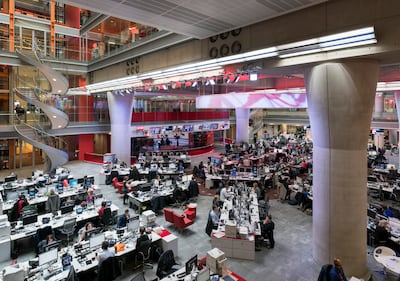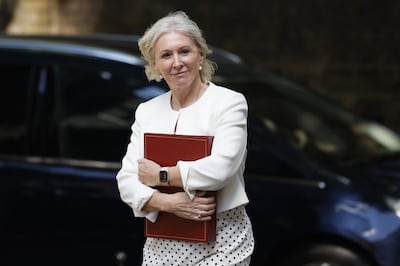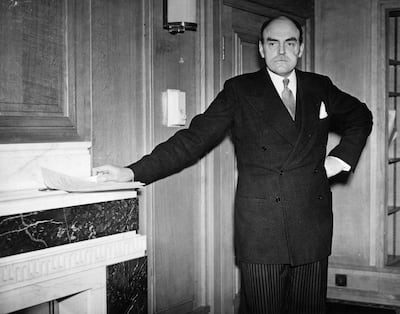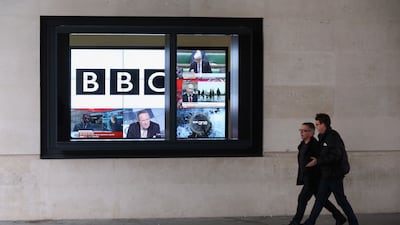AS someone who lives in Britain it is always a shock to go overseas and turn on the BBC World News, with adverts.
Likewise, I guess for someone overseas coming to Britain, it must be a surprise to find the BBC, including the BBC News Channel, without any advertising whatsoever.
They’re different services aimed at different audiences with different revenue streams. One is funded by advertisers and subscribers, the other relies on the domestic licence fee. Now, though, needs must, and the two news channels are coming together in April to create the new BBC News.
There will be visible differences — outside the UK there will be adverts — but effectively, from next month, regardless of where you are on the planet, there will be one 24-hour BBC News channel with a single editorial stream.
They’re merging mainly because the BBC faces a £400m a year funding shortfall by 2027. A long period of Tory rule has seen the Corporation’s budgets whittled away, with the latest blow coming from Nadine Dorries, who as the short-lived Culture Secretary still found time to freeze the licence fee. There was more than a whiff of spite about her move. Dorries wanted to keep taxes down (and the licence fee is effectively a form of tax) but at the same time, taking a swipe at a body loathed by her wing of the Conservative Party for having what they consider to be a left-leaning, Remainer agenda was something to relish.

Against these severe financial constraints, it’s been determined the two live news channels must become one. That does not make it right or straightforward, however.
In any survey of trusted news providers, the BBC scores highly. In many countries, BBC World News is a must-watch. Its public service ethos, underpinned by the still-adhered to principles of the BBC’s first director general, Lord Reith, “to inform, educate and entertain” puts it ahead of many state and commercial rivals for accuracy and reliability. In some nations, where the media remains underdeveloped and speech is not always free, that should not come as a surprise. But even in the US, the BBC enjoys high ratings — during the Trump era, it was to the BBC that many folk turned for independent, objective coverage.
In the UK, the BBC News Channel is watched by 12 million people. So why undo all that good, surely there are other ways of saving money?
Apparently not. But there is also a school of thought that decrees they must combine, that it is illogical to have two separate 24-hour news channels. It’s certainly true that they were both created in a bygone period, in the 1990s, when broadcasting channel launches were the in thing and TV and news in particular, was reaping the benefits of advances in technology and communications.

That was also a time that was pre-digital. The internet was in its infancy and the black oblong in the corner of the room remained ubiquitous viewing, for people of all ages.
Not any more. According to Ofcom, a quarter of all adults watch the BBC News channel, placing it fourth after BBC One, ITV and Facebook as the biggest source of news. Come down in age and the picture changes dramatically. Only 17 per cent of 16 to 24-year-olds watch the BBC News channel, and it lags behind other sources such as Instagram, Twitter, TikTok and WhatsApp.
They’re getting their news on the move, on their mobiles and tablets from all sorts of places. A BBC bulletin invariably presented by a man in a suit and tie or woman in a formal blouse, both of them of a certain age, does not cut it.
The pressure is on to reach this audience, which is why, to some in the BBC, the opportunity to come up with a fresh news service, under the guise of cost-cutting, so appeals. That is why we’re told that the staff on the new channel will dress down. Naja Nielsen, digital director of BBC News, reportedly told them that “sweaty and dirty” looks more “trustworthy” than those who look as if they’re at an awards ceremony. Likewise, BBC TV news bulletins have started carrying footage shot from its reporters’ mobile phones and we can expect more of the same on the new service.
The new channel is intended to save money but also to get down with the kids. There’s nothing wrong with the latter objective, indeed it’s to be commended. The problem will come, though, if that desire to be youthful and “on trend” is prioritised over trust and quality. What will it be, an item about the fiscal options facing Jeremy Hunt in the forthcoming budget or the back-story to the latest track from Harry Styles?

The internal BBC theory is that it’s possible to have both, and that younger people do want serious items — witness climate change — as much as any adult.
There is though, another consequence in unifying two channels, one international, the other domestic. Somehow, the corporation’s news managers must also balance international stories with those from, and about, the UK. In traditional newspaper-parlance it’s the same as uniting the “Home” and “Foreign” desks to produce one offering that must sustain interest, whether the viewer is home or abroad, British or foreign.
That’s no mean feat. As people, we’re naturally more interested in developments closer to us, where we reside, involving places and folk we can relate to. It’s the way we’re wired.
Yes, we want news from elsewhere as well, but as a Brit living in Britain, given the choice of digesting the detail of a land slippage that has crushed three houses in Yorkshire, versus a land slippage engulfing a town in China, Yorkshire will get the nod. That’s not to say we don’t care about the disaster in China, but it just does not grab us the same — it’s too distant and unfamiliar.
Until now, the distinction has not really mattered. In the UK, we had a 24-hour BBC news channel catering for our priorities. Abroad, there was another 24-hour BBC news channel catering for interests there. Never the twain shall meet.
Well, they are about to meet. It could be brilliant, it may end in tears. The world really is watching.


